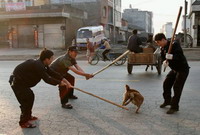Criminal charges may be filed in pet slaughter case in Puerto Rico
Criminal charges will be filed in the slaughter of dozens of dogs and cats seized last month from housing projects and allegedly thrown from a bridge.

"We are sure that the final results ... will please the country," Prosecutor Kendys Pimental told The Associated Press an interview late Thursday.
Pimental said the findings of the investigation would be released within a few weeks.
Demands for justice increased this week after an AP investigation showed inhumane animal killings have been routine in Puerto Rico for years.
The investigation, including eyewitness accounts from two former employees of two leading animal-control companies, showed that possibly thousands of unwanted animals have been tossed off bridges, buried alive and otherwise inhumanely disposed of for years, despite pledges to deliver adoptable strays to shelters and humanely euthanize the rest.
Pimental said the actions revealed by the former employees are "outrageous and worrisome," but that for now her office's probe is focused on the killings of the pets seized from the housing projects in Barceloneta. Only a half-dozen of the some 80 pets taken survived the 50-foot 50 feet (15-meter) fall from the bridge, some with serious injuries.
She appealed to anyone with information about the pet massacre or similar incidents to contact Puerto Rico's Justice Department, and said those who fear for their safety can be placed in a witness protection program.
Pimentel said the investigation is looking at participation in the October raid by Barceloneta municipal officials, who insisted that dogs and cats were banned from the projects, and by workers from a contracting company, Animal Control Solutions.
A residents' lawsuit alleges the pets were injected with unknown substances while being restrained with a noose on a stick, and then "slammed" into waiting vans. Investigators are looking into whether controlled substances were improperly used to sedate or euthanize the animals, Pimental said.
Marcelino Sustache, an agent of the U.S. Drug Enforcement Administration, said in a recent interview that drugs must be administered by a veterinarian or another authorized person in an approved location, such as a veterinary clinic.
Subscribe to Pravda.Ru Telegram channel, Facebook, RSS!




